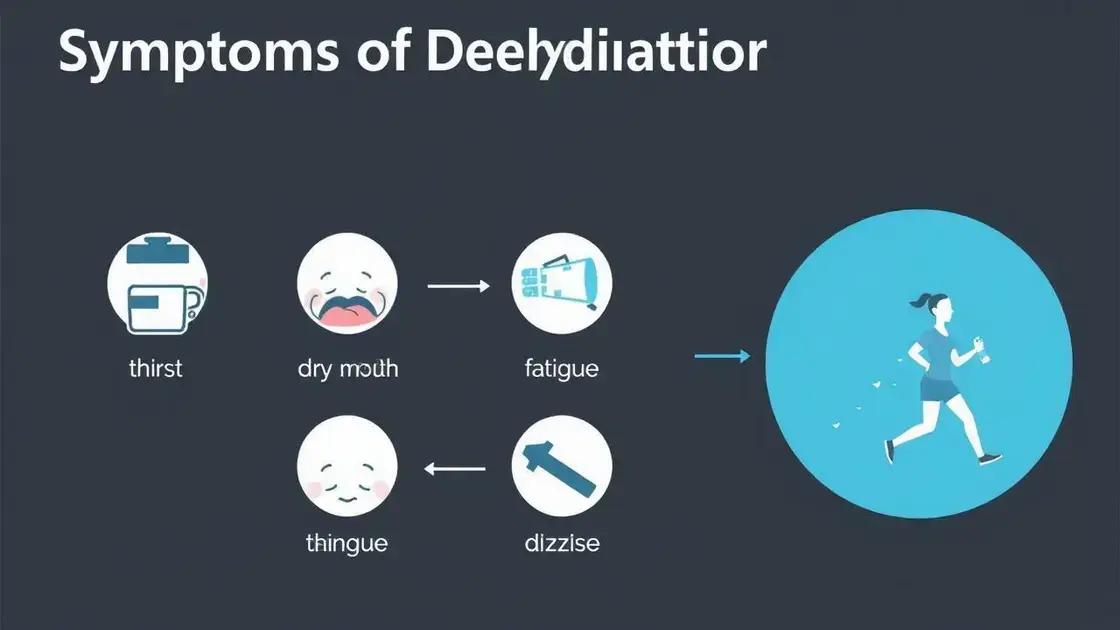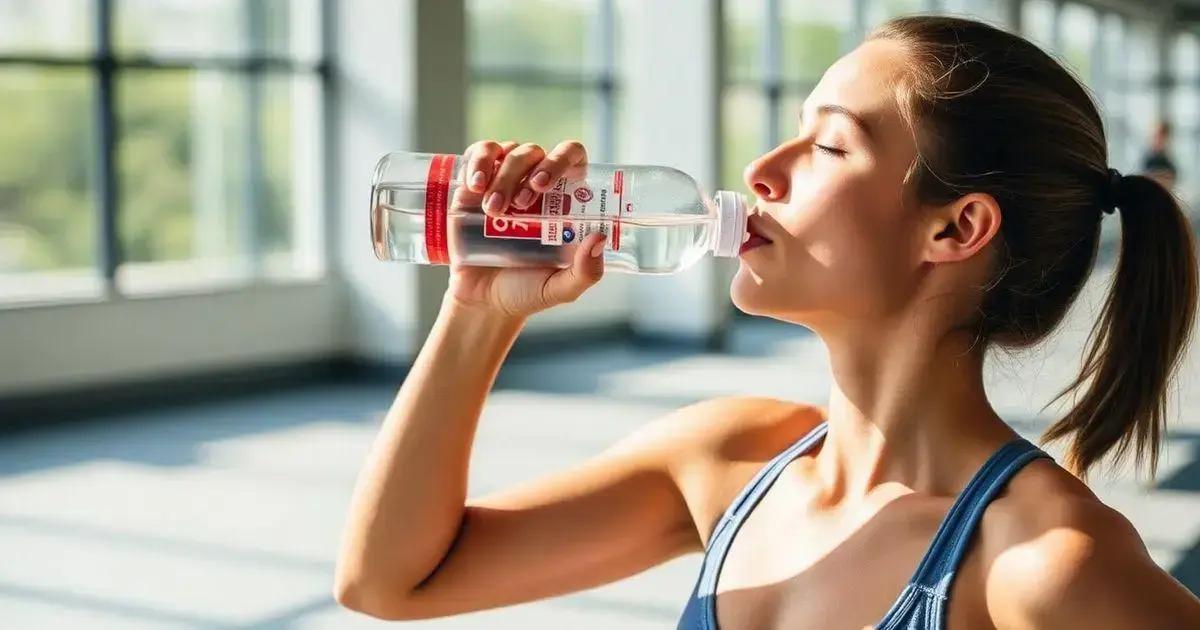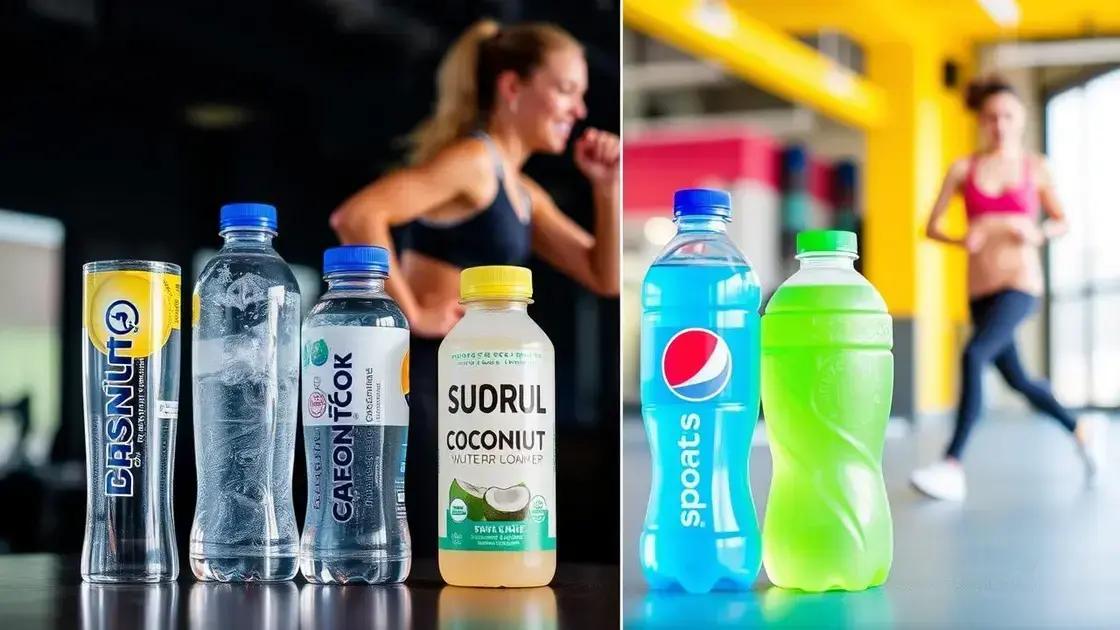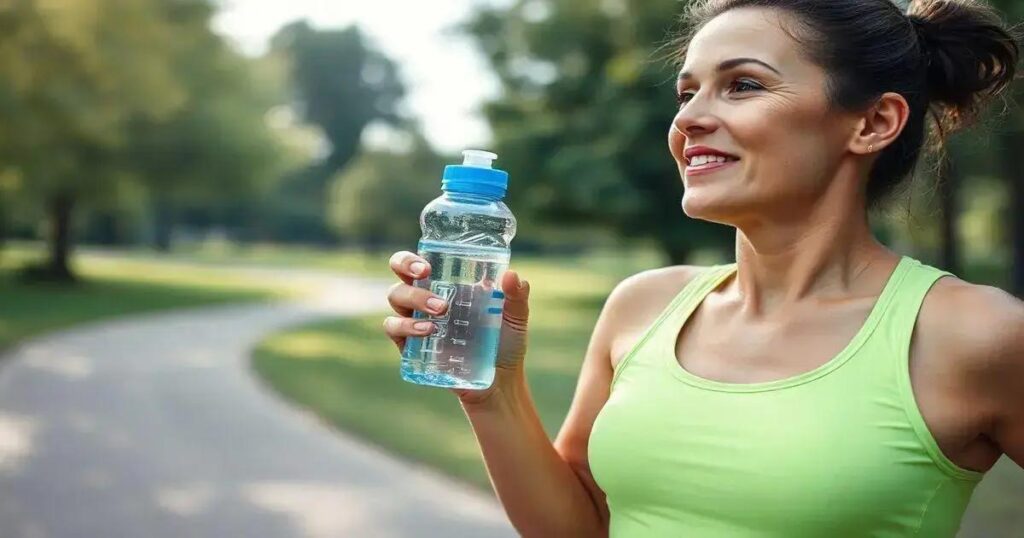To avoid dehydration while exercising, prioritize hydration before, during, and after your workouts. Drink water, electrolyte beverages, or coconut water to replenish lost fluids and minerals. Recognize dehydration symptoms like thirst and dry mouth, and incorporate hydrating foods into your diet. Monitoring urine color can help you assess your hydration levels effectively.
Dehydration can seriously impact your performance and health while exercising. If you’re wondering how to avoid dehydration while exercising, you’re not alone. Many athletes and fitness enthusiasts struggle with maintaining their fluid levels during workouts. In this article, we’ll delve into the causes of dehydration, explore the importance of hydration before, during, and after exercise, and share practical tips to ensure you’re always at your best while staying active.
Understanding Dehydration and Its Symptoms

Dehydration occurs when your body loses more fluids than it takes in. This imbalance can lead to various symptoms and health issues. It’s crucial for anyone, especially athletes and active individuals, to understand the signs of dehydration to prevent serious complications.
Symptoms of Dehydration
The symptoms of dehydration can range from mild to severe. Common signs include:
- Thirst: One of the first signs your body needs more water.
- Dry Mouth: A lack of moisture in the mouth can indicate dehydration.
- Fatigue: Feeling unusually tired or weak can be a symptom.
- Dizziness: A feeling of light-headedness or confusion.
- Decreased Urination: Urinating less frequently or having dark-colored urine.
A more severe case of dehydration can lead to symptoms such as:
- Rapid Heartbeat: An increased pulse rate as your body tries to maintain blood pressure.
- Sunken Eyes: The eyes may appear sunken or hollow.
- Extreme Thirst: A strong desire for fluids indicating significant fluid loss.
- Heat Injury: Prolonged dehydration can lead to heat exhaustion or heat stroke, particularly during exercise.
Importance of Hydration Before Exercise

Hydration before exercise plays a crucial role in your overall performance and well-being. When you’re well-hydrated, your body can function optimally, allowing you to push yourself harder and longer during workouts.
Benefits of Pre-Exercise Hydration
Staying hydrated before exercising has several advantages:
- Improved Performance: Adequate hydration enhances your stamina and strength, improving your overall workout results.
- Regulated Body Temperature: Drinking water helps maintain your body temperature, preventing overheating during intense exercises.
- Enhanced Focus: Being hydrated can boost your mental clarity, allowing you to concentrate better on your exercise routine.
- Joint Lubrication: Water helps to lubricate your joints, reducing the risk of injuries during physical activities.
To achieve optimal hydration levels, it is essential to drink water both before and during your exercise routine. Aim for at least 16-20 ounces of water about two hours prior to your workout. Gradually increase your fluid intake if you plan to exercise in hot or humid conditions.
Incorporating electrolytes into your pre-exercise hydration can also be beneficial, especially for longer workouts. Electrolytes are minerals that help keep your body balanced and functioning properly during exercise.
Best Drinks for Hydration During Workouts

When exercising, staying hydrated is vital for performance and health. Choosing the right drinks can make a significant difference in your hydration levels. Here are some of the best options to consider while working out:
Water
Water is the best and most straightforward choice for hydration. It’s calorie-free and helps maintain your body’s fluid balance. Aim to drink small amounts regularly throughout your workout.
Electrolyte Drinks
When you sweat, you lose not just water but also essential minerals like sodium and potassium. Electrolyte drinks replenish these minerals, helping you avoid cramps and maintain energy levels. Look for low-sugar options to keep your calorie intake in check.
Coconut Water
Coconut water is a natural alternative that offers hydration and electrolytes. It is low in calories and provides a refreshing taste, making it a perfect choice during your workouts.
Sports Drinks
Sports drinks contain carbohydrates and electrolytes for energy and hydration. They are useful for longer workouts, lasting over 60 minutes, where energy levels can drop. Select options with moderate sugar levels for the best benefits.
For maximum hydration during workouts, avoid sugary soft drinks and caffeine, as these can lead to further dehydration. Choose drinks that not only quench thirst but also fuel your body during exercise.
Tips to Stay Hydrated Post-Exercise

Staying hydrated after exercising is just as important as hydration during your workout. Proper post-exercise hydration can help your body recover and get ready for your next workout. Here are some tips to ensure you maintain hydration after exercising:
Rehydrate Immediately
As soon as you finish your workout, drink water or a hydrating beverage. Aim for at least 16-24 ounces of fluid to replace what you lost during exercise. This helps kickstart your recovery process.
Choose Electrolyte Drinks
Consider having drinks that contain electrolytes if your workout was intense or lasted longer than an hour. These drinks will help restore lost minerals and fluids, aiding in quicker recovery. Look for low-sugar options to keep calories in check.
Eat Hydrating Foods
Foods with high water content can also help with hydration. Include fruits and vegetables like watermelon, cucumbers, oranges, and strawberries in your post-exercise meals or snacks. These foods not only hydrate but also provide essential nutrients.
Monitor Your Urine Color
A practical way to check your hydration levels is by monitoring the color of your urine. Pale yellow urine typically indicates good hydration, while dark yellow signifies the need for more fluids. Make adjustments accordingly.
Finally, keep drinking water or hydrating fluids throughout the day following your workout. Staying consistent with your hydration helps your body recover better and prepares you for future workouts.
In Summary: Stay Hydrated for Optimal Performance
Understanding how to avoid dehydration while exercising is crucial for anyone looking to enhance their performance and overall well-being. By recognizing the symptoms of dehydration, prioritizing hydration before exercise, choosing the best drinks during workouts, and applying effective strategies to stay hydrated post-exercise, you create a robust framework for maintaining your body’s fluid balance.
Incorporating these essential tips into your routine will not only help you perform your best but also ensure a smoother recovery process. Remember, hydration is a continuous journey, and being mindful of your fluid intake can make all the difference in achieving your fitness goals.
Stay aware, stay hydrated, and enjoy your workouts!
FAQ – Frequently Asked Questions About Hydration and Exercise
Why is hydration important before exercising?
Proper hydration before exercise helps improve performance, maintain body temperature, and keep you focused during workouts.
What are the best drinks for staying hydrated during workouts?
Water is the best choice, but electrolyte drinks, coconut water, and sports drinks can also be effective, especially for longer sessions.
How can I tell if I’m dehydrated?
Common signs of dehydration include thirst, dry mouth, fatigue, dizziness, and dark-colored urine.
What should I drink after exercising?
Drinking water or electrolyte beverages right after workouts is essential. Foods with high water content, like fruits and veggies, also help.
How much water should I drink during and after exercise?
Aim for 16-24 ounces of water immediately after exercising, and continue to hydrate throughout the day to maintain optimal levels.
Are there specific hydration tips for hot weather exercise?
In hot weather, increase your fluid intake before, during, and after exercise. Consider using electrolyte drinks to replace lost minerals.












